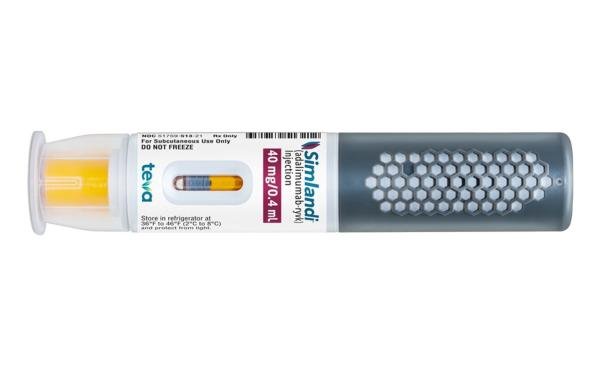Simlandi Interactions
There are 560 drugs known to interact with Simlandi (adalimumab), along with 8 disease interactions. Of the total drug interactions, 303 are major, 248 are moderate, and 9 are minor.
- View all 560 medications that may interact with Simlandi
- View Simlandi disease interactions (8)
Most frequently checked interactions
View interaction reports for Simlandi (adalimumab) and the medicines listed below.
- baclofen
- bupropion
- calcium / vitamin d
- celecoxib
- cetirizine
- clonazepam
- Cymbalta (duloxetine)
- dextroamphetamine
- escitalopram
- famotidine
- folic acid
- gabapentin
- hydroxyzine
- ketoconazole topical
- leflunomide
- Lyrica (pregabalin)
- magnesium oxide
- metformin
- methotrexate
- metoprolol
- mirtazapine
- ondansetron
- pantoprazole
- prednisone
- sertraline
- tramadol
- trazodone
- Tylenol Extra Strength (acetaminophen)
- Vitamin C (ascorbic acid)
- Vitamin D3 (cholecalciferol)
Simlandi disease interactions
There are 8 disease interactions with Simlandi (adalimumab) which include:
- infections
- malignancies
- neurologic reactions
- tuberculosis
- CHF
- COPD
- hematologic abnormalities
- hepatitis B
More about Simlandi (adalimumab)
- Simlandi consumer information
- Compare alternatives
- Reviews (2)
- Drug images
- Side effects
- Dosage information
- During pregnancy
- FDA approval history
- Drug class: TNF alfa inhibitors
- Breastfeeding
Related treatment guides
Drug Interaction Classification
| Highly clinically significant. Avoid combinations; the risk of the interaction outweighs the benefit. | |
| Moderately clinically significant. Usually avoid combinations; use it only under special circumstances. | |
| Minimally clinically significant. Minimize risk; assess risk and consider an alternative drug, take steps to circumvent the interaction risk and/or institute a monitoring plan. | |
| No interaction information available. |
See also:
Further information
Always consult your healthcare provider to ensure the information displayed on this page applies to your personal circumstances.


